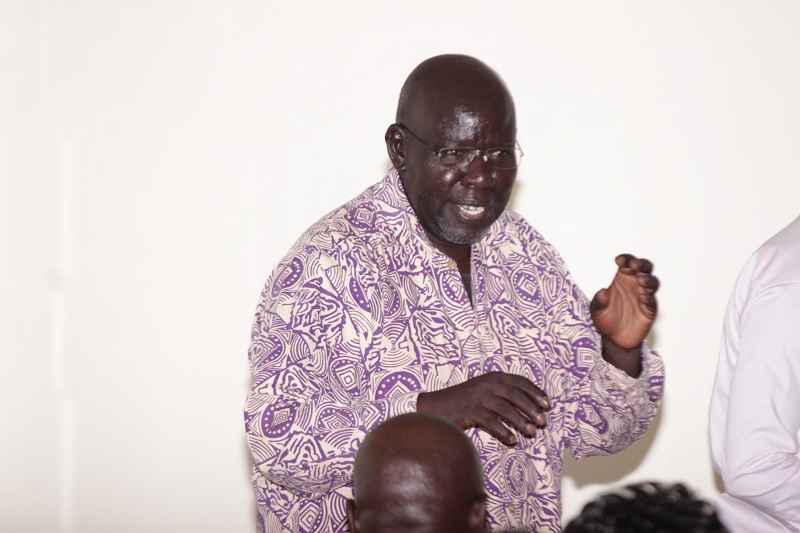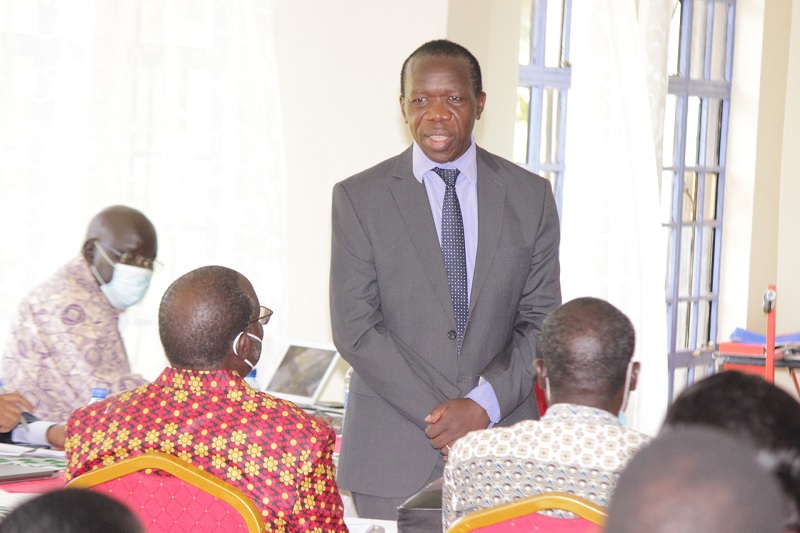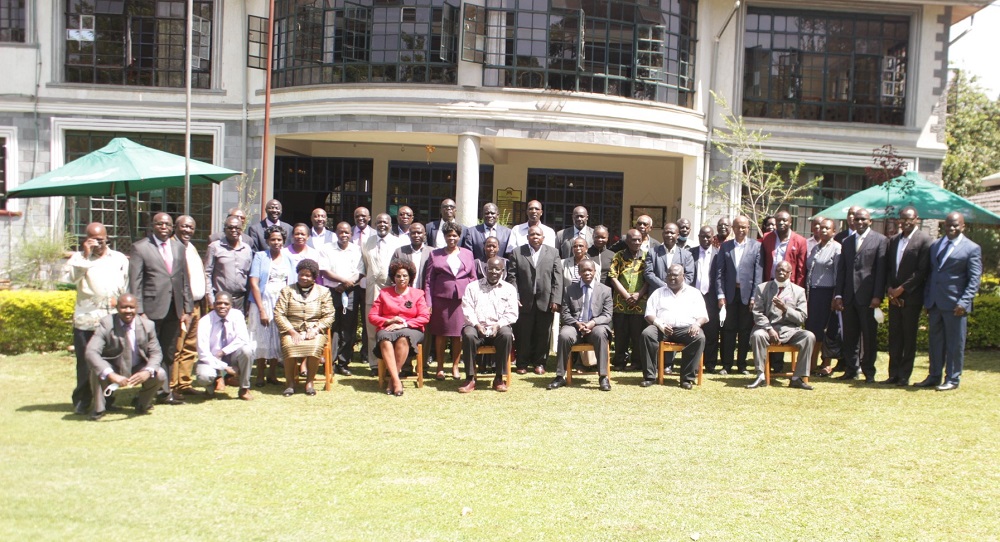“We are now refining these researches for external funding. However, very few Professors were involved as team leaders or members of the various research teams. It is important that we address this seeming apathy from our Professors,” he said.
The Chairperson of the MMUST Professors Forum (MPF), Prof. Josephine Ngaira, gave highlights of the MPF and its activities. She stated that the MPF is a think-tank of the University where all Professors meet to discuss and respond to emerging issues of academic nature.
“The MMUST Professors Forum provides effective mentorship strategies, protects standards of scholarship, and plays an advisory role to the University among others. The workshop being held today, therefore, is aimed at further sensitizing MMUST Professors on our roles and responsibilities in making the University visible in her core mandate,” she said.
Prof. Ngaira gave a breakdown of MMUST Professors by gender where it was noted that the ratio of male to female Full Professors was 90.3 to 9.6 while that of Associate Professors was 78 to 22 respectively. These Professors range from humanities, social sciences and STEM. From the statistics, she stated that there was need to agitate for gender balance. She urged MMUST Council to put deliberate Performance Contract targets towards attainment of the 2/3 gender rule.
Prof. David Some who gave the keynote speech spoke on ‘The Role of a Professor as an Academic Mentor’. In his remarks, he outlined important qualities of a good professor, a teacher/mentor, a good researcher and their roles in outreach programs.
“A good professor is available, enthusiastic and exercises fairness. Good communication skills coupled with a friendly and engaging personality sets out a professor as a good mentor and teacher,” he stated.

Prof. David Some giving his keynote remarks
In community service, Prof. Some noted that a good professor should provide excellent leadership by engaging in dialogue on matters at hand and being passionate about the environment. As a good researcher, a professor should be imaginative, creative, available and should attract grants.
Prof. Some further noted that it was the responsibility of Higher Education Institutions (HEI) to revolutionize the country through responsible and quality management of higher education. Further, he stated that HEIs have the responsibility to innovate for the future as they are responsible for the society and the labor market.
The Vice Chancellor, Prof. Solomon Shibairo, challenged Professors to set themselves apart from the rest of other staff.
“How different are you from other staff? A professor ought to be a research leader, consultant in their niche areas, chair of research teams and a role model. In the community, you are expected to be an opinion shaper and provide guidance at all levels of influence,” he said.
The Vice Chancellor decried the ratio of male to female Professors at the University citing that there was need to deliberately determine how to increase the number of female professors.
“Out of the three hundred and sixty (360) academic staff, at least a 1/3 of them should be professors. However, we need to positively move the ratio of male to female professors. How, then, do we mentor female lecturers to become professors?” he posed.
The Vice Chancellor stated that Council was willing to support initiatives that would see this positive trajectory. He urged the Professors present to develop an advisory paper outlining steps to remedy the situation which would be used to inform Council.

The Vice Chancellor, Prof. Solomon Shibairo, making his presentation
The Vice Chancellor also stated that he expected Professors to initiate programmes, especially postgraduate programmes and innovations, which would market the University. He further urged them to publish in reputable journals indicating that it was important for academic staff to be informed, on a day to day basis, on where to publish.
The Deputy Vice Chancellor -Planning, Research and Innovation, Prof. Charles Mutai, emphasized the need for Professors to offer academic leadership in curriculum development, research and teaching while also addressing issues affecting the nation especially in their areas of specialization.
“MMUST has 67 Professors. How do we leverage on this number? We need to involve ourselves in consultancies and conduct research on behalf of counties, the nation and as wide as regionally and internationally,” he said.
Prof. Mutai stated that the University was in the process of searching for opportunities for researchers. To make the process effective, however, he encouraged Professors to establish a web presence by being visible on GoogleScholar, ResearchGate among others. He further urged them to establish a media presence by lending their voices on topical issues affecting the society and developing position papers on the same. This, he emphasized, would market the University.
On his part, the Deputy Vice Chancellor in charge of Academic and Students Affairs, Prof. Hussein Golicha reminded Professors that they are the highest ranking officers in a university. As such, a Professor is a team leader, organizer, teacher, leader and mentor.
‘A Professor has been described elsewhere as a person-old man or woman-who knows so much about so little. A Professor is not permanent. He must, therefore, create him/herself. This is the reason why mentorship is important so that Professors can nurture others and counter the reducing number of professors,” he said.
Prof. Golicha said that his Division will work closely with the Professors to create departmental research teams.
The Deputy Vice Chancellor-Administration and Finance, Prof. Kuria Thuo acknowledged the importance of such mentorship programs stating that it would be prudent to extend the same to other faculty members of staff.
‘These mentorship programs can also include the social and economic dimensions apart from research, teaching and community outreach. This will help in devising well-informed implementation strategies and structural frameworks in decision making especially on resource allocation,” he said.
Other topics of discussion during the Workshop were;
- Role of Professors in Informing National Education Policy through Research (Prof. J.O Shiundu)
Professors should influence or directly involve themselves in policy making based on empirical research evidence. They should also write policy briefs and position papers, share research with policy makers, evaluate and critique existing policies.
- Role of Professors in Departmental/School Administration and Management (Prof. Silvery Oteng’i)
Build good relationships between Professors and senior management by exercising humility and building ethical standards and values.
- Role of Professors in Assuring Quality in Research (Prof. Vincent Omolo)
Uphold degree of excellence in the publication and dissemination of research findings.
- Role of Professors in Conferences and Seminar Organization (Rev. Prof. Judith Achoka)
Professors are a think tank of knowledge as they organize educative conferences and seminars.
- Role of Professors in Recruitment, Deployment and Retention of Staff (Prof. Kuria Thuo)
Professors take part in policy creation for employment of staff, formulation of statutes, sit in shortlisting committees, interview panels, deployment process, induction and in Alternative Dispute Resolution.
- Role of Professors in Curriculum Development and Instruction (Prof. Hussein Golicha)
Professors participate in curriculum development and instruction as planners, makers, developers, implementers and teaching.
- Roles and Expectations from Associate Professors (Prof. Judah Ndiku)
Associate Professors are expected to offer leadership, mentorship, research resources and empower upcoming scholars.
- Inaugural Lecture Presentations (Prof. Frank Matanga)
An Inaugural Lecture is a significant milestone in a Professor’s career. It is groundbreaking either conceptually or theoretically.
A raft of recommendations was made on each of the topics covered with the aim of streamlining the role of MMUST Professors in University administration and management. Among some of the recommendations made include:
- Establishment of a consultancy office which is at its final stages,
- Implementing affirmative action to raise the number of female professors,
- Cultivating and strengthening mentorship culture to cut across academia and administration,
- Make it a policy for professors to involve themselves in part time teaching where need requires,
- Write a policy brief to the National Assembly on composition of university Councils to include professors,
- Conduct a Training of Trainers workshop for senior faculty to improve quality of research.
- Benchmark with relevant institutions for a comparative outlook on content and structure of Inaugural Lectures. Develop a Concept Paper/policy, thereafter.
- Construction of low cost offices in the next financial year.
- Employ research grant professors.
- Engage Research Fellows in each School as per the Staff Establishment.
- Alumni to set up a firm to support research and upcoming faculty
- Renovation of Milimani houses (at 85% completion rate) to house Senior Common rooms.
By: Nashilluh Brendah Kabindio
Photos by: Wilberforce Shiundu





